Corey Redekop's Blog, page 40
September 13, 2011
Tiny Monkey - The Canterbury Trail by Angie Anjou
The Canterbury Trail
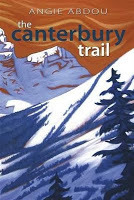 (Brindle & Glass, 2011)
(Brindle & Glass, 2011)
by Angie Anjou
Description (from the publisher website):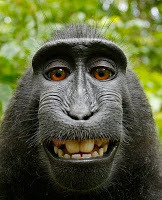 What the Tiny Monkey thinks:
What the Tiny Monkey thinks:
I am sadly not familiar with Geoffrey Chaucer's The Canterbury Tales , so I cannot comment on Angie Anjou's adherence or deviations to the original plot. What I can say is that Anjou is a first-class writer who captures the fluidity and exertions of the human body like few others. While her debut novel The Bone Cage was far more centered around a sports theme, Trail shows that Anjou really knows her stuff when it comes to the white powder and those who live to frolic in it. Anjou understands that sex, drugs, and alcohol are key components of the lifestyle, but she never lets the stereotypes become, well, stereotypical. These ski bums, mountain men, snow bunnies, and extreme snowboarders may be the equivalent of Canadian archetypes, but Anjou cannily subverts our expectations at every turn, finding unexpected pockets of humanity beneath the layers of Gore-Tex. This is not an A-to-Z type of plot; it meanders down back roads and hidden paths, and not every trek is a winner. But the whole is definitely greater than the sum, and for those with a taste for the offbeat and a fearlessness when it comes to a challenge, The Canterbury Trail offers up a plethora of pleasures.
Tiny Monkey Really Likes
 (Brindle & Glass, 2011)
(Brindle & Glass, 2011)by Angie Anjou
Description (from the publisher website):
It's the last ski weekend of the season and a mishmash of snow-enthusiasts is on its way to a remote backwoods cabin. In an odd pilgrimage through the mountains, the townsfolk of Coalton—from the ski bum to the urbanite—embark on a bizarre adventure that walks the line between comedy and tragedy. As the rednecks mount their sleds and the hippies snowshoe through the cedar forest, we see rivals converge for the weekend. While readers follow the characters on their voyage up and over the mountain, stereotypes of ski-town culture fall away. Loco, the ski bum, is about to start his first real job; Alison, the urbanite, is forced to learn how to wield an avalanche shovel; and Michael, the real estate developer, is high on mushroom tea.
In a blend of mordant humour and heartbreak, Angie Abdou chronicles a day in the life of these industrious few as they attempt to conquer the mountain. In an avalanche of action, Angie Abdou explores the way in which people treat their fellow citizens and the landscape they love.
 What the Tiny Monkey thinks:
What the Tiny Monkey thinks: I am sadly not familiar with Geoffrey Chaucer's The Canterbury Tales , so I cannot comment on Angie Anjou's adherence or deviations to the original plot. What I can say is that Anjou is a first-class writer who captures the fluidity and exertions of the human body like few others. While her debut novel The Bone Cage was far more centered around a sports theme, Trail shows that Anjou really knows her stuff when it comes to the white powder and those who live to frolic in it. Anjou understands that sex, drugs, and alcohol are key components of the lifestyle, but she never lets the stereotypes become, well, stereotypical. These ski bums, mountain men, snow bunnies, and extreme snowboarders may be the equivalent of Canadian archetypes, but Anjou cannily subverts our expectations at every turn, finding unexpected pockets of humanity beneath the layers of Gore-Tex. This is not an A-to-Z type of plot; it meanders down back roads and hidden paths, and not every trek is a winner. But the whole is definitely greater than the sum, and for those with a taste for the offbeat and a fearlessness when it comes to a challenge, The Canterbury Trail offers up a plethora of pleasures.
Tiny Monkey Really Likes
Published on September 13, 2011 17:22
September 11, 2011
Tiny Monkey - Annabel, by Kathleen Winter
It's time for a new style of review, methinks. I am far behind in my postings of late, and a lesser monkey would likely give up.
A bigger monkey would post every day. A silverback gorilla, say.
But I, a lowly chimp stuck in the middle, can only do so much.
And so, I present my newest review format, the Tiny Monkey (who doesn't love tiny monkeys?)! A quick rundown of a novel that allows you access to my innermost thoughts, yet dispenses with the long-winded criticism and obscure asides that are my hallmark!
Yes, I'm lazy, but to catch up, this is what I'm doing. I will not be completely abandoning in-depth critical snarkiness, mind you, just forgoing it for the time being.
And so, the inaugural entry of Tiny Monkey:
Annabel (Anansi, 2010)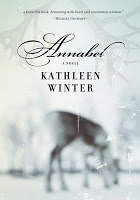
by Kathleen Winter
Plot (from the publisher website): What the Tiny Monkey thinks:
What the Tiny Monkey thinks:
Captured within the pages of Annabel is some of the most exquistely exacting prose I've come across. There are sentences that take my breath away, and I have rarely if ever witnessed an author so accurately capture the dynamics of family relationships. Winter's reproduction of Jacinta's and Treadway's marriage is breathtaking, and the undercurrent of confusion that paints Wayne's relationship with his father is heartbreaking. The ending is somewhat of a letdown, being more traditional and unsurprising than what has happened before, and I'm not entirely convinced of Treadway's ultimate circumstance being organic to the story. But Wayne's unique bildungsroman is a treasure, and when Annabel flies, it soars. Kathleen Winter has penned a jewel, and joins her brother Michael (go read The Big Why right now) into the ranks of Canada's next generation of great authors.
Tiny Monkey Really Likes
A bigger monkey would post every day. A silverback gorilla, say.
But I, a lowly chimp stuck in the middle, can only do so much.
And so, I present my newest review format, the Tiny Monkey (who doesn't love tiny monkeys?)! A quick rundown of a novel that allows you access to my innermost thoughts, yet dispenses with the long-winded criticism and obscure asides that are my hallmark!
Yes, I'm lazy, but to catch up, this is what I'm doing. I will not be completely abandoning in-depth critical snarkiness, mind you, just forgoing it for the time being.
And so, the inaugural entry of Tiny Monkey:
Annabel (Anansi, 2010)

by Kathleen Winter
Plot (from the publisher website):
In 1968, into the beautiful, spare environment of remote coastal Labrador, a mysterious child is born: a baby who appears to be neither fully boy nor girl, but both at once. Only three people are privy to the secret -- the baby's parents, Jacinta and Treadway, and a trusted neighbour, Thomasina. Together the adults make a difficult decision: to raise the child as a boy named Wayne. But as Wayne grows to adulthood within the hyper-masculine hunting culture of his father, his shadow-self -- a girl he thinks of as Annabel -- is never entirely extinguished, and indeed is secretly nurtured by the women in his life.
Haunting, sweeping in scope, and stylistically reminiscent of Jeffrey Eugenides' Middlesex, Annabel is a compelling debut novel about one person's struggle to discover the truth in a culture that shuns contradiction.
 What the Tiny Monkey thinks:
What the Tiny Monkey thinks: Captured within the pages of Annabel is some of the most exquistely exacting prose I've come across. There are sentences that take my breath away, and I have rarely if ever witnessed an author so accurately capture the dynamics of family relationships. Winter's reproduction of Jacinta's and Treadway's marriage is breathtaking, and the undercurrent of confusion that paints Wayne's relationship with his father is heartbreaking. The ending is somewhat of a letdown, being more traditional and unsurprising than what has happened before, and I'm not entirely convinced of Treadway's ultimate circumstance being organic to the story. But Wayne's unique bildungsroman is a treasure, and when Annabel flies, it soars. Kathleen Winter has penned a jewel, and joins her brother Michael (go read The Big Why right now) into the ranks of Canada's next generation of great authors.
Tiny Monkey Really Likes
Published on September 11, 2011 11:51
August 27, 2011
Monkey droppings - A triumphant triad of delights
It has been a while since I've last posted. Apologies, all seven of you. I have no excuse save laziness. And I am working on a new book, so there's that. There's only so many words I can use in a day.
But today, a cornucopia! Three (3!) semi-short reviews of a magical bent, guaranteed* to provide you with endless hours of top-notch entertainment.
*not a guarantee
The Magician King (Viking, 2011)
Lev Grossman
Two years later, and here we are, presented with The Magician King, an immensely worthy follow-up that expands upon the themes of the original while further laying out a world many will desperately yearn to be true. If the Potter fanatics, now grown, are looking for a new sensation to whet their starving imaginations, this is the series to do it.
King begins where most fantasy novels end: Quentin and his friends are kings and queens of the land of Fillory, growing fat, lazy, and bored. Unsatisfied, Quentin decides to explore beyond the limits of Fillory, to the rarely visited Outer Island, which was owing his new kingdom in back taxes. "It wasn't the Fellowship of the Ring, but then again he wasn't trying to save the world from Sauron, he was attempting to perform a tax audit on a bunch of hick islanders." Taking a cue from The Voyage from the Dawn Treader, Quentin commandeers the ship Muntjac, and sets out with Julia (his friend from Magicians who was denied entry to Brakebills) to see how far the limits of his royal powers can take him.
To better keep the story grounded for the reader, Grossman also relates the tale of Julia, a secondary character in Magicians who proves herself a darker and arguably more interesting specimen than Quentin. Julia, denied a proper magicians education, takes to the back alleys and side streets of the world to learn magic the hard way. Her adventures, grim, gritty, and sexual, balance against the wondrous fantasy world which (as my experiences with Ed Greenwood have proved) can be a bit of a chore to read after a while.
As always, the subtext of maturation weaves through the stories, Quentin coming to understand that wisdom and maturity do not simply come with age. The ending, as fantastical in setting as it is emotionally devastating in impact, comes through Grossman's expert handling of character (from my perspective, a true rarity in such novels). The Magician King is a work of maturity as well, an acceptance that there are gray areas to the human experience that cannot be resolved either through magical summonings or acts of heroism. Its only drawback is that I will now have to wait years for the promised finale.
Low Town (Doubleday, 2011)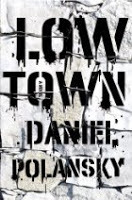
Daniel Polansky
The 'hero' is a nameless gent known only as The Warden, once an enforcer of law, now a drug-dealing low life in Low Town, the harshest district of the city of Rigus of the Thirteen Lands. Life is hardly easy, but The Warden has been able to carve a niche for himself through a keen mind and a judicious use of physical violence. When a small girl goes missing, it is only another hardship to ignore, but when The Warden discovers the girl's mutilated corpse, he finds himself unwillingly placed in charge of hunting down the killer.
Polansky layers his tale with all the tropes of the classic pulps; casual racism (here mostly represented by a race known as the Kiren), stool pigeons, drug use, flashes of vivid violence, both men and women of loose morals, and moments of gloriously over-the-top prose such as "Its voice was shattered porcelain and bruises on a woman." The Warden is an anti-hero straight from Andrew Vachss' Burke school of brutal enforcers with rarely-exposed glimpses of moral outrage.
All this would be fine (and I'm sure, based on what's on the page, that Polansky could deliver a hell of a classic pulp novel should he wish), but the author pushes the story into delirious WTF territory with his setting, as well as as the liberal doses of sorcery, wizards, and otherworldly monsters. What's most interesting, however, is not this unusual setting, but Polansky's refusal to rely on magic as a crutch, instead crafting the tale as a true mystery. The Warden may understand the perils of magic, but he's no practitioner of the dark arts; he doggedly pursues leads and suspects through clues and informers, not through, say, a magical portal that reveals all to those who are pure of heart. The world may have access to magic, but The Warden is a creature of the real.
While there may be other examples of fantasy noir, I can't say I'm too familiar with them, Jeff Vandermeer's brilliant Finch and China Mieville's astonishing The City and the City being the exceptions. Low Town may not be in quite the same league, being closer in spirit to John Meaney's flawed but inherently interesting fantasy police procedural Bone Song. Yet Low Town is a confident debut from a new talent, and I await further exploits of Polansky and The Warden with real excitement.
The Thackery T. Lambshead Cabinet of Curiosities (Harper Voyager, 2011)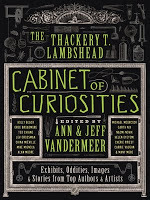
Ann & Jeff Vandermeer (eds.)
Cabinet, a companion to The Thackery T. Lambshead Pocket Guide to Eccentric & Discredited Diseases (now out of print, but I'm going to definitely track down a copy for myself), is a brilliantly imagined conceit, an examination of the strangest collection of antiques, oddities, and stories assembled by the genius Thackery T. Lambshead, a man who "existed on the fringes of medical science." After his death of "banal pulmonary failure" at his house in Whimpering-on-the-Brook, England, his vast accumulation of artifacts and curios has been catalogued, and careful selections are presented here, along with stories penned by some of the modern genre greats.
As befits the fictional collection, Cabinet harbours a myriad of delights, along with gorgeous paintings, sketches, and photographs (the book itself is gorgeous). Luminaries such as Michael Moorcock, China Mieville, Mike Mignola, Alan Moore, Lev Grossman, Tad Williams, Minister Faust, and dozens beside contribute tales, descriptions, and more, resulting in an anthology of vastly differing styles and themes. The entries, bearing titles such as Dunkelblau's Meistergarten, The Electrical Neurheographiton, the Clockroach, and The Thing in the Jar, are wondrous and strange, completely original, and sadly fictional (I want an Automatic Nanny).
The Thackery T. Lambshead Cabinet of Curiosities is an anthology of prodigious brilliance, bizarre wit, and expansive imaginations. As evidenced by this, alongside their amazing anthologies Steampunk, Steampunk II, and Bestiary (cross your fingers on that one, and yes, I am a contributor), Mr. and Mrs. Vandermeer are purveyors of the weird of the highest order.
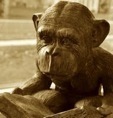 VERDICT ON ALL THREE: YOU CANNOT POSSIBLY GO WRONG
VERDICT ON ALL THREE: YOU CANNOT POSSIBLY GO WRONG

But today, a cornucopia! Three (3!) semi-short reviews of a magical bent, guaranteed* to provide you with endless hours of top-notch entertainment.
*not a guarantee
The Magician King (Viking, 2011)

Lev Grossman
He liked the dryads, the mysterious nymphs who watched over oak trees. You really knew you were in a magical fantasy otherworld when a beautiful woman wearing a skimpy dress made of leaves suddenly jumped out of a tree.In 2009, Lev Grossman combined an intense fervor for the fantasy genre with a talented imagination to his novel The Magicians, an ode to the Harry Potter/Chronicles of Narnia books sheathed in adult post-modern sensibilities. Following his fallible young 'hero' Quentin Coldwater through the rigours of (for lack of a better description) magicians college Brakebills, Grossman posited a finely-hued world made up of the realities of today and the possibilities of true magic. It ended on a note of melancholy, as Quentin — older, slightly wiser, and hardened through combat — re-entered the fictional world of Fillory to find what he sought: true adventure. It was a bold, absorbing work that left as all good novels of the genre do, on an uncertain note, as if there are further exploits to tell.
Two years later, and here we are, presented with The Magician King, an immensely worthy follow-up that expands upon the themes of the original while further laying out a world many will desperately yearn to be true. If the Potter fanatics, now grown, are looking for a new sensation to whet their starving imaginations, this is the series to do it.
King begins where most fantasy novels end: Quentin and his friends are kings and queens of the land of Fillory, growing fat, lazy, and bored. Unsatisfied, Quentin decides to explore beyond the limits of Fillory, to the rarely visited Outer Island, which was owing his new kingdom in back taxes. "It wasn't the Fellowship of the Ring, but then again he wasn't trying to save the world from Sauron, he was attempting to perform a tax audit on a bunch of hick islanders." Taking a cue from The Voyage from the Dawn Treader, Quentin commandeers the ship Muntjac, and sets out with Julia (his friend from Magicians who was denied entry to Brakebills) to see how far the limits of his royal powers can take him.
To better keep the story grounded for the reader, Grossman also relates the tale of Julia, a secondary character in Magicians who proves herself a darker and arguably more interesting specimen than Quentin. Julia, denied a proper magicians education, takes to the back alleys and side streets of the world to learn magic the hard way. Her adventures, grim, gritty, and sexual, balance against the wondrous fantasy world which (as my experiences with Ed Greenwood have proved) can be a bit of a chore to read after a while.
As always, the subtext of maturation weaves through the stories, Quentin coming to understand that wisdom and maturity do not simply come with age. The ending, as fantastical in setting as it is emotionally devastating in impact, comes through Grossman's expert handling of character (from my perspective, a true rarity in such novels). The Magician King is a work of maturity as well, an acceptance that there are gray areas to the human experience that cannot be resolved either through magical summonings or acts of heroism. Its only drawback is that I will now have to wait years for the promised finale.
Low Town (Doubleday, 2011)

Daniel Polansky
I awoke with a headache that made my swollen ankle feel like a hand-job from a ten-ochre-an-hour hooker.It is such a simple idea: take the tenets of the hard-boiled detective novel and apply them to a middle-ages fantasy world a la Middle Earth. It's a bold concept, and easy to completely screw up, so it's a relief when Daniel Polansky debut novel Low Town turns out to be fun. It's icing on the cake when it turns out to be fantastic, a mix of Mickey Spillane and J.R.R. Tolkien that goes down as smooth as a vial of pixie's breath.
The 'hero' is a nameless gent known only as The Warden, once an enforcer of law, now a drug-dealing low life in Low Town, the harshest district of the city of Rigus of the Thirteen Lands. Life is hardly easy, but The Warden has been able to carve a niche for himself through a keen mind and a judicious use of physical violence. When a small girl goes missing, it is only another hardship to ignore, but when The Warden discovers the girl's mutilated corpse, he finds himself unwillingly placed in charge of hunting down the killer.
Polansky layers his tale with all the tropes of the classic pulps; casual racism (here mostly represented by a race known as the Kiren), stool pigeons, drug use, flashes of vivid violence, both men and women of loose morals, and moments of gloriously over-the-top prose such as "Its voice was shattered porcelain and bruises on a woman." The Warden is an anti-hero straight from Andrew Vachss' Burke school of brutal enforcers with rarely-exposed glimpses of moral outrage.
All this would be fine (and I'm sure, based on what's on the page, that Polansky could deliver a hell of a classic pulp novel should he wish), but the author pushes the story into delirious WTF territory with his setting, as well as as the liberal doses of sorcery, wizards, and otherworldly monsters. What's most interesting, however, is not this unusual setting, but Polansky's refusal to rely on magic as a crutch, instead crafting the tale as a true mystery. The Warden may understand the perils of magic, but he's no practitioner of the dark arts; he doggedly pursues leads and suspects through clues and informers, not through, say, a magical portal that reveals all to those who are pure of heart. The world may have access to magic, but The Warden is a creature of the real.
While there may be other examples of fantasy noir, I can't say I'm too familiar with them, Jeff Vandermeer's brilliant Finch and China Mieville's astonishing The City and the City being the exceptions. Low Town may not be in quite the same league, being closer in spirit to John Meaney's flawed but inherently interesting fantasy police procedural Bone Song. Yet Low Town is a confident debut from a new talent, and I await further exploits of Polansky and The Warden with real excitement.
The Thackery T. Lambshead Cabinet of Curiosities (Harper Voyager, 2011)

Ann & Jeff Vandermeer (eds.)
His one, platonic, relationship seems to have been with a young mathematician and computer scientists named Alan Turing. Their dalliance let to the latter's formulation of his famous Wykeham-Rackham Test, which raised the question of whether it would be possible to devise a robot so lifelike that it would be impossible to tell it apart from a human being while making love to it.There's a fair amount of geeky in-joking in the above two sentences. If you don't quite get it, then you may find The Thackery T. Lambshead Cabinet of Curiosities to be quite odd. If you do get it, then you'll find the Cabinet to be right up your alley.
Cabinet, a companion to The Thackery T. Lambshead Pocket Guide to Eccentric & Discredited Diseases (now out of print, but I'm going to definitely track down a copy for myself), is a brilliantly imagined conceit, an examination of the strangest collection of antiques, oddities, and stories assembled by the genius Thackery T. Lambshead, a man who "existed on the fringes of medical science." After his death of "banal pulmonary failure" at his house in Whimpering-on-the-Brook, England, his vast accumulation of artifacts and curios has been catalogued, and careful selections are presented here, along with stories penned by some of the modern genre greats.
As befits the fictional collection, Cabinet harbours a myriad of delights, along with gorgeous paintings, sketches, and photographs (the book itself is gorgeous). Luminaries such as Michael Moorcock, China Mieville, Mike Mignola, Alan Moore, Lev Grossman, Tad Williams, Minister Faust, and dozens beside contribute tales, descriptions, and more, resulting in an anthology of vastly differing styles and themes. The entries, bearing titles such as Dunkelblau's Meistergarten, The Electrical Neurheographiton, the Clockroach, and The Thing in the Jar, are wondrous and strange, completely original, and sadly fictional (I want an Automatic Nanny).
The Thackery T. Lambshead Cabinet of Curiosities is an anthology of prodigious brilliance, bizarre wit, and expansive imaginations. As evidenced by this, alongside their amazing anthologies Steampunk, Steampunk II, and Bestiary (cross your fingers on that one, and yes, I am a contributor), Mr. and Mrs. Vandermeer are purveyors of the weird of the highest order.
 VERDICT ON ALL THREE: YOU CANNOT POSSIBLY GO WRONG
VERDICT ON ALL THREE: YOU CANNOT POSSIBLY GO WRONG
Published on August 27, 2011 12:38
July 16, 2011
Monkey droppings - Canadian authors and their demons. Seriously literate demons.
Once again, the shelf monkey pits genre writers against one another! In the octagon!
This time, two Canadian genre authors, each dealing with unimaginable horrors in their own unique ways.
An unimaginable Canuck horror? Sounds unlikely, but have you seen our government lately? More terrifying than ogopogo and sasquatch combined.
The Thirteen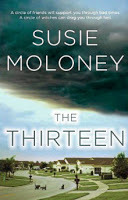 (Random House Canada, 2011)
(Random House Canada, 2011)
by Susie Moloney
And between you, me, and the Internet trolls, promoting Susie Moloney's new effort the The Thirteen as a cross between Desperate Housewives and The Witches of Eastwick isn't helping win me over (I'm assuming that the Moloney's publicist is referring to the enjoyably daft Jack Nicholson/Cher/Susan Sarandon/Michelle Pfeiffer movie, and not the original and immeasurably darker John Updike novel).
I'm willing to give Moloney a chance, however. Her novel A Dry Spell was an often riveting piece of genre thriller/horror, and The Dwelling a nifty and atmospheric haunted house tale. Moloney has the gift of rooting fantastic tales in the real, creating tension through an appreciation of character as well as a real sense of menace.
At first, The Thirteen has menace in spades, with a gangbuster prologue involving a grieving widow, a lighter, and several gallons of gasoline. Her friends do not respond quite as one would anticipate, and it does not detract from the story to reveal that the women of the neighbourhood have formed a cabal of witches. Now that one of their own is gone, the circle is incomplete. Yet there is a chance; after one of the oldest, Audra, takes mysteriously ill, her long-absent daughter Paula returns, her daughter Rowan in tow, and the surviving witches see not only an opportunity to reseal the circle, but to present an offering to the dark one in the bargain.
Moloney is careful to lay the groundwork for her main characters, allowing us to better sympathize with the mother/daughter team as they move back to a neighbourhood of weirdly cheerful citizens. At times, Moloney evokes the subtle satire and horror of Ira Levin at his best (Rosemary's Baby, The Stepford Wives); there is true creepiness in many scenes, especially when the cabal meets to woo Paula over, with inane promises of "It's great. You'll love it. Your hair will be thicker, your skin so clear and smooth." There is the promise that The Thirteen could become an incisive satire of the forced domesticity of the suburbs, of the need to stay young and beautiful forever and the lengths we travel to keep themselves in comfort.
Alas, it was not to be. Despite such ripe possibilities, Moloney barely grazes the satire and instead amps up the horror. There's nothing inherently wrong with this, and she proves herself again a terrific talent when it comes to gruesomeness. She certainly does not shy away from some of the more unsavory aspects of witching, rewarding the reader with scenes of unsettling carnality and violence.
Yet The Thirteen is a novel that could have benefited from another hundred pages or so. It feels like the author is rushing to the finale, so quickly that several secondary characters who prove themselves vital to the conclusion get short shrift, their actions thus appearing random and essentially unmotivated (in particular the troublesome indecisiveness of Paula's childhood friend Marla, whose motivations appear to grow from plot necessity rather than a fully-formed character need). This is a dilemma common to all of Moloney's work so far: superb set-ups, but rather unsatisfying conclusions. There is so much that is good that it's a letdown that the end result is only entertaining. Moloney has proven herself as a genre writer of talent and verve; I only wish she had fleshed out the story a little more to give it an emotional base that would serve to heighten the horror.
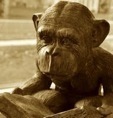 VERDICT: MONKEY LIKES IT AS A BEACH READ, WANTED TO LOVE IT AS A CLASSIC
VERDICT: MONKEY LIKES IT AS A BEACH READ, WANTED TO LOVE IT AS A CLASSIC
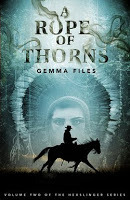 A Rope of Thorns (by Gemma Files
A Rope of Thorns (by Gemma Files
I laid down a lot of praise for Files' first entry in her Hexslinger trilogy, A Book of Tongues, finding it a delightfully nasty/tasty treat, a sui generis grab bag melange of magical realism, Aztec, Mayan, and Christian gods, cowboys, horses, and repugnant anti-heroes, all tied together in the form of a western so gruesome and gritty it made me want to take a shower. Lovely stuff.
Now, scant weeks after I acquainted myself with her talents comes A Rope of Thorns, the second novel in the trilogy, and an equally impressive follow-up. At this rate, the third novel better explode the world at least twice to keep up the level of excitement and intensity. This is a fantasy series for adults, so you'd better cowboy up if you want to survive. For those who yearn for the next Harry Potter-like series, be warned; the brave and resourceful Harry would have been dead and his body desecrated and defiled within five minutes in Files' universe.
Following on the heels of the first, Thorns finds the outlaw and newly-minted hexslinger Chess Pargeter wandering the west with his companion Ed Morrow and a young spiritualist named Yancey Colder, looking for the Reverend Ash Rook, the man who stole Chess' heart. Literally. Had it ripped right out of him in a resurrection ceremony in book one: "His breastbone . . . cleft and barely re-sewn, each no-beat of his own missing organ a hammer-blow echoing from the inside out." Rook has joined forces with the goddess Ixchel to form Hex City, the first place on the planet where magicians can live without feeling the urge to tear each other apart (a side effect of having such powers). To get to Rook, however, Chess has to face many foes, including the whole of the Pinkerton Detective Agency, his own hair-trigger temper, and most gory of all, the resurrected Sheriff Mesach Love and his fearsome evangelical powers over death:
Where is Files going with all this? I cannot tell, except that the finale will no doubt be apocalyptic in scope, a battle which will make Potter's last stand at Hogwarts seem a slap fight between fifth graders. Right now, I put The Hexslinger series in the top tier of my favourite urban fantasy series, right up there with King's Gunslinger/Dark Tower mythos, Barker's Art Trilogy (if the third is ever finished), and (hopefully, as I have not yet read the upcoming second installment) Lev Grossman's Fillory novels.
 VERDICT: MONKEY LOVES
VERDICT: MONKEY LOVES
This time, two Canadian genre authors, each dealing with unimaginable horrors in their own unique ways.
An unimaginable Canuck horror? Sounds unlikely, but have you seen our government lately? More terrifying than ogopogo and sasquatch combined.
The Thirteen
 (Random House Canada, 2011)
(Random House Canada, 2011)by Susie Moloney
I'm not a huge fan of witches. When compared to their counterparts (wizards, magicians), the witch just seems to pale in comparison. Sure, they've got chants and potions, and the right ear of Satan himself, but they just aren't as cool. Genre-wise, they peaked right about when Margaret Hamilton first tried to steal the ruby slippers from Judy Garland.The suburbs were deadly boring. And there were too many cats.
And between you, me, and the Internet trolls, promoting Susie Moloney's new effort the The Thirteen as a cross between Desperate Housewives and The Witches of Eastwick isn't helping win me over (I'm assuming that the Moloney's publicist is referring to the enjoyably daft Jack Nicholson/Cher/Susan Sarandon/Michelle Pfeiffer movie, and not the original and immeasurably darker John Updike novel).
I'm willing to give Moloney a chance, however. Her novel A Dry Spell was an often riveting piece of genre thriller/horror, and The Dwelling a nifty and atmospheric haunted house tale. Moloney has the gift of rooting fantastic tales in the real, creating tension through an appreciation of character as well as a real sense of menace.
At first, The Thirteen has menace in spades, with a gangbuster prologue involving a grieving widow, a lighter, and several gallons of gasoline. Her friends do not respond quite as one would anticipate, and it does not detract from the story to reveal that the women of the neighbourhood have formed a cabal of witches. Now that one of their own is gone, the circle is incomplete. Yet there is a chance; after one of the oldest, Audra, takes mysteriously ill, her long-absent daughter Paula returns, her daughter Rowan in tow, and the surviving witches see not only an opportunity to reseal the circle, but to present an offering to the dark one in the bargain.
Moloney is careful to lay the groundwork for her main characters, allowing us to better sympathize with the mother/daughter team as they move back to a neighbourhood of weirdly cheerful citizens. At times, Moloney evokes the subtle satire and horror of Ira Levin at his best (Rosemary's Baby, The Stepford Wives); there is true creepiness in many scenes, especially when the cabal meets to woo Paula over, with inane promises of "It's great. You'll love it. Your hair will be thicker, your skin so clear and smooth." There is the promise that The Thirteen could become an incisive satire of the forced domesticity of the suburbs, of the need to stay young and beautiful forever and the lengths we travel to keep themselves in comfort.
Alas, it was not to be. Despite such ripe possibilities, Moloney barely grazes the satire and instead amps up the horror. There's nothing inherently wrong with this, and she proves herself again a terrific talent when it comes to gruesomeness. She certainly does not shy away from some of the more unsavory aspects of witching, rewarding the reader with scenes of unsettling carnality and violence.
Yet The Thirteen is a novel that could have benefited from another hundred pages or so. It feels like the author is rushing to the finale, so quickly that several secondary characters who prove themselves vital to the conclusion get short shrift, their actions thus appearing random and essentially unmotivated (in particular the troublesome indecisiveness of Paula's childhood friend Marla, whose motivations appear to grow from plot necessity rather than a fully-formed character need). This is a dilemma common to all of Moloney's work so far: superb set-ups, but rather unsatisfying conclusions. There is so much that is good that it's a letdown that the end result is only entertaining. Moloney has proven herself as a genre writer of talent and verve; I only wish she had fleshed out the story a little more to give it an emotional base that would serve to heighten the horror.
 VERDICT: MONKEY LIKES IT AS A BEACH READ, WANTED TO LOVE IT AS A CLASSIC
VERDICT: MONKEY LIKES IT AS A BEACH READ, WANTED TO LOVE IT AS A CLASSIC A Rope of Thorns (by Gemma Files
A Rope of Thorns (by Gemma FilesAs Moloney is to Stephen King (finding horror in the mundane), so Gemma Files is to Clive Barker (anything freaking goes).This was no mere confidence-show, some drab provoking ghosts for profit, telling sad and frightened folk what they most wanted to believe, but the truth behind a thousand pretty lies made flesh.
I laid down a lot of praise for Files' first entry in her Hexslinger trilogy, A Book of Tongues, finding it a delightfully nasty/tasty treat, a sui generis grab bag melange of magical realism, Aztec, Mayan, and Christian gods, cowboys, horses, and repugnant anti-heroes, all tied together in the form of a western so gruesome and gritty it made me want to take a shower. Lovely stuff.
Now, scant weeks after I acquainted myself with her talents comes A Rope of Thorns, the second novel in the trilogy, and an equally impressive follow-up. At this rate, the third novel better explode the world at least twice to keep up the level of excitement and intensity. This is a fantasy series for adults, so you'd better cowboy up if you want to survive. For those who yearn for the next Harry Potter-like series, be warned; the brave and resourceful Harry would have been dead and his body desecrated and defiled within five minutes in Files' universe.
Following on the heels of the first, Thorns finds the outlaw and newly-minted hexslinger Chess Pargeter wandering the west with his companion Ed Morrow and a young spiritualist named Yancey Colder, looking for the Reverend Ash Rook, the man who stole Chess' heart. Literally. Had it ripped right out of him in a resurrection ceremony in book one: "His breastbone . . . cleft and barely re-sewn, each no-beat of his own missing organ a hammer-blow echoing from the inside out." Rook has joined forces with the goddess Ixchel to form Hex City, the first place on the planet where magicians can live without feeling the urge to tear each other apart (a side effect of having such powers). To get to Rook, however, Chess has to face many foes, including the whole of the Pinkerton Detective Agency, his own hair-trigger temper, and most gory of all, the resurrected Sheriff Mesach Love and his fearsome evangelical powers over death:
After the vicious Tongues, Rope is a true middle chapter, as our heroes (?) wander on their quest, vanquishing foes while incrementally getting closer to their goal. What that goal is, is in some doubt, as Chess—as violent and psychotic a protagonist as there has ever been— actually grows as a character, learning the limits of his power and actually evolving into something far more interesting. He starts Rope looking purely for revenge, but as Chess becomes more self-aware, he begins to see his place in the world, and understands the concepts of consequences and fate. If Chess had simply remained a remorseless stone-cold killer, Rope would still have been entertaining, but this stab at personal growth, Chess' actual attainment of empathy, is what allows the narrative to grow accordingly. There is still all the frank intergender sex of the first, but Files has leavened the outrageousness of the first through a deepening of the bonds between the leads. Chess and Ed may not become the next Frodo and Sam, but their quest is just as dangerous, and unlike those lovable hobbits, there is no doubt on the subject of homoeroticism.[Yancey] felt herself stagger, caught up one more time by Ed Morrow's welcome arm; clutched close to its warmth for comfort, finding none. Because—those figures arrayed 'round Love, just waiting—she knew them . . . had known them. They hung as if by hooks through the neck, all their weight dangling limp, black eyes staring off to a dozen different quarters. And woven over it all, pallid flesh and dirty rigs alike—sewn through the muscle, covering bone where it showed, blossoming crimson pods at every cheesecloth-skinned joint—a net of Weed throbbed and knotted, a hundred thousand marionette cords grown thick and juicy, hideously animate.
Where is Files going with all this? I cannot tell, except that the finale will no doubt be apocalyptic in scope, a battle which will make Potter's last stand at Hogwarts seem a slap fight between fifth graders. Right now, I put The Hexslinger series in the top tier of my favourite urban fantasy series, right up there with King's Gunslinger/Dark Tower mythos, Barker's Art Trilogy (if the third is ever finished), and (hopefully, as I have not yet read the upcoming second installment) Lev Grossman's Fillory novels.
 VERDICT: MONKEY LOVES
VERDICT: MONKEY LOVES
Published on July 16, 2011 11:05
The monkey has irons in the fire...
...many irons! Huge, blazing irons! I have no idea what the phrase means!
Anyways, in between work and editing the second novel, I garnered the opportunity to briefly work with many people I admire on a (hopefully) upcoming project of massive coolness.
From Ecstatic Days (the website of author Jeff Vandermeer):
And the couple behind the project, Ann and Jeff Vandermeer, have earned my lifetime respect for both their passion for bring unusal genre efforts to the public eye, and their past releases which never fail to entertain. Jeff's Finch was one of my favourite novels last year, and I just completed his non-fiction effort The Steampunk Bible, an informative and lovely examination of the steampunk genre (and if you don't know what steampunk is, look it up). I am currently reading Ann and Jeff's new anthologies Steampunk II: Steampunk Reloaded (a wonderful collection of steampunk stories from some amazing authors), and The Thackery T. Lambshead Cabinet of Curiosities, a bizarre and often hilarious tome of vignettes and stories that document a fictional collection of fantabulous inventions that should be realized into fact post-haste (again from some terrific authors [China Mieville!]).
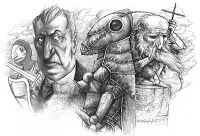 As revealed above, I have already submitted my bestiary entry, the unusual animal known as "Bartleby's Typewriter." And what, exactly, is a Bartleby's Typewriter? I'll never tell, unless this gets published, in which case I'll be obligated to. And if Ivica Stevanovic does a drawing? Holy freaking s|-|it! I will pay top dollar for the original artwork!
As revealed above, I have already submitted my bestiary entry, the unusual animal known as "Bartleby's Typewriter." And what, exactly, is a Bartleby's Typewriter? I'll never tell, unless this gets published, in which case I'll be obligated to. And if Ivica Stevanovic does a drawing? Holy freaking s|-|it! I will pay top dollar for the original artwork!
So, cross your fingers that this gets completed. If it does, it may not be the longest piece I've ever written, but it will be the coolest thing I've ever attached my name to.
Anyways, in between work and editing the second novel, I garnered the opportunity to briefly work with many people I admire on a (hopefully) upcoming project of massive coolness.
From Ecstatic Days (the website of author Jeff Vandermeer):
Now you tell me that doesn't sound all kinds of awesomesauce! And what a lineup! I'm not familiar with every author's work, but I can tell you that Brian Evenson is a spectacularly dark writer whose Last Days is one of the bleakest reads of the past few years, and Stephen Graham Jones was just this year nominated for the Shirley Jackson Award for his collection The One that Got Away (Jeff Vandermeer is also a finalist for his on-my-future-reading pile The Third Bear). I can't admit familiarity with many of the authors, but a little research has gotten me very excited, particularly in the case of Felix Gilman's recent novel The Half-Made World.Ann and I have (rather quietly) put together a unique new project over the past few month: a Bestiary with the imaginative working title of…Bestiary. In an A-Z format, with a couple extras, the anthology will contain all original fiction. Think of it as a cryptozoological text for the twenty-first century, although some entries go far back into history. (Ivica Stevanovic is on board as an artist.)
For this project we wanted to assemble the writers ahead of time and then sell the anthology, so a huge thank you to our contributors for being willing to send us material on such a speculative basis. The antho will make the rounds to editors in August.
Although we're still in the editing phase, we do now have our final line-up, revealed here in its entirety for the first time. We think it's a stellar group of writers. Certainly what we consider a kind of dream team, and in several cases our first opportunity to work with favorite writers who we hadn't yet had a chance to publish. It's a little overwhelming to think we have an original Michal Ajvaz—terrifically funny and pointed—and an original Vandana Singh and an original Karen Lord and Cat Valente and…well, if we keep going we'll wind up listing everyone!
A: "The Auricle" by Gio Clairval
B: "Bartleby's Typewriter" by Corey Redekop
C: "The Counsellor Crow" by Karen Lord
D: "Daydreamer by Proxy" by Dexter Palmer
E: "Enkantong-bato" by Dean Francis Alfar
F: "The Figmon" by Michael Cisco
G: "The Guest" by Brian Conn
H: "Hadrian's Sparrikan" by Stephen Graham Jones
I: "Ible" by Brian Evenson
J: "Jason Bug" by Joseph Nigg
K: "The Karmantid" by Karen Heuler
L: "The Liwat'ang Yawa and the Litok-litok" by Rochita Loenin-Ruiz
M: "Mosquito Boy" by Felix Gilman
N: "N—– (Bolus Barathruma)" by Reza Negarestani
O: "Orsinus Liborum" by Catherynne M. Valente
P: "Pyret" by Karin Tidbeck
Q: "Quintus" by Michal Ajvaz
R: "Rapacis X. Loco Signa" by L.L. Hannett
S: "Snafu" by Micaela Morrissette
T: "Tongues of Moon Toad" by Cat Rambo
U: "The Ugly-Nest Rat" by Eric Schaller
V: "The Vanga" by Rikki Ducornet
W: "Weialalaleia" by Amal El-Mohtar
X: "The Xaratan" by Rhys Hughes
Y: "Yakshantariksh" by Vandana Singh
Z: "Zee" by Richard Howard
&: "Ampersand" by Karin Lowachee
(Not shown: a creature whose name begins with invisible letter, written by an anonymous writer who is not one of the editors…)
And the couple behind the project, Ann and Jeff Vandermeer, have earned my lifetime respect for both their passion for bring unusal genre efforts to the public eye, and their past releases which never fail to entertain. Jeff's Finch was one of my favourite novels last year, and I just completed his non-fiction effort The Steampunk Bible, an informative and lovely examination of the steampunk genre (and if you don't know what steampunk is, look it up). I am currently reading Ann and Jeff's new anthologies Steampunk II: Steampunk Reloaded (a wonderful collection of steampunk stories from some amazing authors), and The Thackery T. Lambshead Cabinet of Curiosities, a bizarre and often hilarious tome of vignettes and stories that document a fictional collection of fantabulous inventions that should be realized into fact post-haste (again from some terrific authors [China Mieville!]).
 As revealed above, I have already submitted my bestiary entry, the unusual animal known as "Bartleby's Typewriter." And what, exactly, is a Bartleby's Typewriter? I'll never tell, unless this gets published, in which case I'll be obligated to. And if Ivica Stevanovic does a drawing? Holy freaking s|-|it! I will pay top dollar for the original artwork!
As revealed above, I have already submitted my bestiary entry, the unusual animal known as "Bartleby's Typewriter." And what, exactly, is a Bartleby's Typewriter? I'll never tell, unless this gets published, in which case I'll be obligated to. And if Ivica Stevanovic does a drawing? Holy freaking s|-|it! I will pay top dollar for the original artwork!So, cross your fingers that this gets completed. If it does, it may not be the longest piece I've ever written, but it will be the coolest thing I've ever attached my name to.
Published on July 16, 2011 09:04
June 26, 2011
Monkey Droppings -Robopocalypse vs. Major Karnage! Winner take all!
Today, the monkey pits two two sci-fi actioneers against each other.
One is a heavily-hyped apocalyptic epic with a huge promotional push and expectations up the ying-yang.
The other is an unassuming, almost unheard-of sleeper from an unknown Canadian author.
Guess which one works, and which one doesn't?
Robopocalypse (Doubleday, 2011)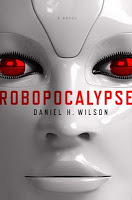
by Daniel H. Wilson
Quite easily, as it turns out.
It's all in the execution. Depending on whose hands wield the power, a tale of robots battling mankind can be either spectacular, exciting, and thought-provoking (think The Terminator), or dreary, repetitive, and uninspiring (Transformers). Robopocalypse lands far on the lesser end of the spectrum; it has some good ideas, but it has a paucity of style, little originality, and not much in the way of imagination.
Granted, it starts out nicely, as an oral history of humanity's battle with the robots (tremendously reminiscent of the format of Max Brooks' World War Z, a novel about the zombie uprising that is nowhere near perfect, but aces out Robopocalypse on every level). Humanity is just starting to recover from its years-long struggle, a struggle which began at the advent of artificial intelligence. The intelligence Archos viewed mankind as a danger, both to itself and to all other forms of life on Earth, and began the conquest of the planet through control of all mechanized resources it could summon.
There is a hint of real originality at one point, when true artificial intelligence is created in other robots, who then in turn decide to rebel against their robot overlord, but such flourishes are lost in pages of deadening prose and disposable, interchangeable characters. Three days after completion, I am hard-pressed to remember anything of the plot save a few scenes of robotic warfare that would, in a movie version, likely raise the coolness factor, but in the book merely get an eyebrow raise. I got far more entertainment in twenty-two minutes from the robot rebellion in the episode "Mother's Day" from Futurama, where I was treated to humour, style, and the image of Hermes Conrad screaming "Help! My stapler is collating me alive!" while being chased by an electric stapler. Not to mention the immortal phrase, "Conquer Earth, you bastards!"
So Robopocalypse isn't great, or even good, but what's even more damaging is that it is a dull, dull book. Direct comparisons are made in the publicity to Michael Crichton and Robert A. Heinlein, but Wilson has none of the satiric or stylistic flair of the latter, and very little of the former's ability to synthesize believable scientific research into a propulsive plot. Crichton was no maestro, but at his best (The Andromeda Strain, Sphere) he was able to throw out vast quantities of scientific exposition that never bogged down the storyline but instead actually enhanced it. Crichton didn't write great art, but he wrote great pulp (until he became bogged down in his own portentousness). Wilson's research isn't half as well presented, and never remotely believable, which lends the book an air of fantasy rather than the true-to-life science it appears to aim for.
Robopocalypse is a real let-down, not even a mildly diverting beach read. I was promised Crichton and Heinlein, Spielberg and James Cameron; I was given Michael Bay instead. Not a fair exchange.
Not even close.
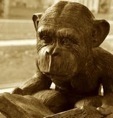
VERDICT: MONKEY IS DEEPLY DISAPPOINTED
Major Karnage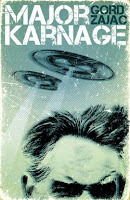 (Chizine, 2010)
(Chizine, 2010)
by Gord Zajac
Major John Karneski ('Major Karnage' to his friends/enemies) is unhappily enjoying forced retirement. After many glorious campaigns, he and his soldiers have been forcibly confined to a Veteran's Home for observation and re-education. In a world without war, a world completely run by the Dabney Corporation and its mascot cat, warriors are unnecessary, but people as violent as Karnage cannot be expected to meld back into society willingly. So for the better part of two decades Karnage has been held against his will, his violent tendencies held in check by a Sanity Patch on the back of his head which will explode if stress levels reach critical mass. At the start of Major Karnage, the patch is set at Lemon Breeze, with colour-coded levels that run the gamut from Snow White to Tricycle Red, with stops at Daffodil, Citrus Blast, Peachy Keen, Tangy Orange, Sharp Cheddar, Coral Essence, and many others. At Tricycle Red: boom!
But Karnage knows that the world is not safe. His man Cookie has been receiving alien transmissions in his skull, and it looks as if Unidentified Flying Objects of Death! are already on their way to lay waste to humankind. Only Karnage can hope to halt the invasion, but he'll have to fight his way past the guards, and then have to cope with a world that has moved on without him. To save the world, Karnage will have to deal with Dabneycops armed with Goober Guns, bizarre religious cults, alien sandworms, squidbugs, and a diligent cop named Sydney who can incapacitate a man with one flick of her baby toe:
Let's face it, you are either in the mood for such entertainment, or you're not. Me? Sign me up for more. Zajac is not a great stylist, but he moves his plot along with a sense of fun that is impossible to fake. There's more than a bit of the joy of Harry Harrison's Stainless Steel Rat series and the early satire of Heinlein to be found here, by way of Douglas Adams. It's an anything goes, balls to the wall approach that can be wearying, but manages to hit all the right notes. It's nonsense, but it's good nonsense. ChiZine has always put out a quality product, but this may be their first release that is just out and out genre merriment.
If Zajac sees fit to continue the adventures of Karnage, I, for one, will be eagerly awaiting the next installment. Robopocalypse may get the endorsements and the mega-budget film, but Major Karnage is the winner.

VERDICT: MONKEY LEAVES WELL-SATED

One is a heavily-hyped apocalyptic epic with a huge promotional push and expectations up the ying-yang.
The other is an unassuming, almost unheard-of sleeper from an unknown Canadian author.
Guess which one works, and which one doesn't?
Robopocalypse (Doubleday, 2011)

by Daniel H. Wilson
"You humans are biological machines designed to create ever more intelligent tools. You have reached the pinnacle of your species. All your ancestors' lives, the rise and fall of your nations, every pink and squirming baby—they have all led you here, to this moment, where you have fulfilled the destiny of humankind and created your successor. You have expired. You have accomplished what you were designed to do."This is the big one, the tentpole action epic of the summer reading season! A high concept thrill ride, already speculated to soon be adapted to film by Steven Spielberg! With blurbs by heavy-hitters such as Clive Cussler! Lincoln Child! Robert Crais! The author Daniel Wilson has a Ph.D. in robotics! He's a genius! How could this be anything less than a genre masterpiece?
Quite easily, as it turns out.
It's all in the execution. Depending on whose hands wield the power, a tale of robots battling mankind can be either spectacular, exciting, and thought-provoking (think The Terminator), or dreary, repetitive, and uninspiring (Transformers). Robopocalypse lands far on the lesser end of the spectrum; it has some good ideas, but it has a paucity of style, little originality, and not much in the way of imagination.
Granted, it starts out nicely, as an oral history of humanity's battle with the robots (tremendously reminiscent of the format of Max Brooks' World War Z, a novel about the zombie uprising that is nowhere near perfect, but aces out Robopocalypse on every level). Humanity is just starting to recover from its years-long struggle, a struggle which began at the advent of artificial intelligence. The intelligence Archos viewed mankind as a danger, both to itself and to all other forms of life on Earth, and began the conquest of the planet through control of all mechanized resources it could summon.
There is a hint of real originality at one point, when true artificial intelligence is created in other robots, who then in turn decide to rebel against their robot overlord, but such flourishes are lost in pages of deadening prose and disposable, interchangeable characters. Three days after completion, I am hard-pressed to remember anything of the plot save a few scenes of robotic warfare that would, in a movie version, likely raise the coolness factor, but in the book merely get an eyebrow raise. I got far more entertainment in twenty-two minutes from the robot rebellion in the episode "Mother's Day" from Futurama, where I was treated to humour, style, and the image of Hermes Conrad screaming "Help! My stapler is collating me alive!" while being chased by an electric stapler. Not to mention the immortal phrase, "Conquer Earth, you bastards!"
So Robopocalypse isn't great, or even good, but what's even more damaging is that it is a dull, dull book. Direct comparisons are made in the publicity to Michael Crichton and Robert A. Heinlein, but Wilson has none of the satiric or stylistic flair of the latter, and very little of the former's ability to synthesize believable scientific research into a propulsive plot. Crichton was no maestro, but at his best (The Andromeda Strain, Sphere) he was able to throw out vast quantities of scientific exposition that never bogged down the storyline but instead actually enhanced it. Crichton didn't write great art, but he wrote great pulp (until he became bogged down in his own portentousness). Wilson's research isn't half as well presented, and never remotely believable, which lends the book an air of fantasy rather than the true-to-life science it appears to aim for.
Robopocalypse is a real let-down, not even a mildly diverting beach read. I was promised Crichton and Heinlein, Spielberg and James Cameron; I was given Michael Bay instead. Not a fair exchange.
Not even close.

VERDICT: MONKEY IS DEEPLY DISAPPOINTED
Major Karnage
 (Chizine, 2010)
(Chizine, 2010)by Gord Zajac
"Welcome to the Dabney Correctional Executive Class Hospitality Centre. We hope your stay with us is a pleasant one. Please enjoy these pastoral images and soothing mood music while you await trial and sentencing. And remember—at Dabney Correctional, we believe everyone is innocent until proven guilty. And it shows."Now, see, if you're going to be derivative, this is how you do it.
Major John Karneski ('Major Karnage' to his friends/enemies) is unhappily enjoying forced retirement. After many glorious campaigns, he and his soldiers have been forcibly confined to a Veteran's Home for observation and re-education. In a world without war, a world completely run by the Dabney Corporation and its mascot cat, warriors are unnecessary, but people as violent as Karnage cannot be expected to meld back into society willingly. So for the better part of two decades Karnage has been held against his will, his violent tendencies held in check by a Sanity Patch on the back of his head which will explode if stress levels reach critical mass. At the start of Major Karnage, the patch is set at Lemon Breeze, with colour-coded levels that run the gamut from Snow White to Tricycle Red, with stops at Daffodil, Citrus Blast, Peachy Keen, Tangy Orange, Sharp Cheddar, Coral Essence, and many others. At Tricycle Red: boom!
But Karnage knows that the world is not safe. His man Cookie has been receiving alien transmissions in his skull, and it looks as if Unidentified Flying Objects of Death! are already on their way to lay waste to humankind. Only Karnage can hope to halt the invasion, but he'll have to fight his way past the guards, and then have to cope with a world that has moved on without him. To save the world, Karnage will have to deal with Dabneycops armed with Goober Guns, bizarre religious cults, alien sandworms, squidbugs, and a diligent cop named Sydney who can incapacitate a man with one flick of her baby toe:
"[Karnage had] never seen anyone move like this before. It was like a martial arts version of shiatsu. Sydney knew all the right pressure points to cause extreme pain in the body. It was brilliant. It was like ballet, except it didn't suck."Quite obviously, Gord Zajac is first and foremost concerned with having a good time. This is not hard science fiction, and unlike Robopocalypse it doesn't have any pretensions to be. No, this is glorious b-movie-worth sci-fi ridiculousness, a non-stop chase through a landscape limited only by Zajac's imagination. Heavily indebted to pretty much every movie and novel you can think of, Zajac begs, borrows, and steals to great effect, steamrolling over plotholes and inconsistencies with glee.
Let's face it, you are either in the mood for such entertainment, or you're not. Me? Sign me up for more. Zajac is not a great stylist, but he moves his plot along with a sense of fun that is impossible to fake. There's more than a bit of the joy of Harry Harrison's Stainless Steel Rat series and the early satire of Heinlein to be found here, by way of Douglas Adams. It's an anything goes, balls to the wall approach that can be wearying, but manages to hit all the right notes. It's nonsense, but it's good nonsense. ChiZine has always put out a quality product, but this may be their first release that is just out and out genre merriment.
If Zajac sees fit to continue the adventures of Karnage, I, for one, will be eagerly awaiting the next installment. Robopocalypse may get the endorsements and the mega-budget film, but Major Karnage is the winner.

VERDICT: MONKEY LEAVES WELL-SATED
Published on June 26, 2011 07:16
June 14, 2011
Monkey droppings - magic, magic everywhere, but not a drop to drink
Today, the monkey goes in search of magic and adventure.
And he finds some.
And he learns that sometimes, magic is not enough.
Vegas Knights (2011, Angry Robot)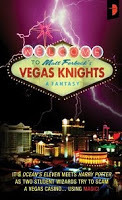
by Matt Forbeck
I love me some magic realism. Taking the world as it is today, twisting it out of shape through supernatural means, always entertains me a sight more than the usual fantasy output of vaguely middle age-ish scenarios wherein dwarfs, elves, and centaurs form gangs and quest to their hearts content. Not that those are necessarily bad, it's just that I have a hard time relating. Put those same characters in a realistic setting, and I'm there. Lev Grossman's The Magicians is one of the best fantasies I've read in years, right up there with Susanna Clarke's Jonathan Strange and Mr. Norrell.
So a novel about magicians set loose in Nevada would seem ideal. Or at least fun. And Matt Forbeck's novel is fun, in a free-wheeling, loosey-goosey way. I just wish it had some more meat on its bones.
Bill and Jackson are, outwardly, fun-loving young men bursting to have a good time on the Vegas strip. In actuality, they are novice magicians, on break from their college courses in "trans-quantum postulating," looking to fleece some casinos during Spring Break. Being able to predict cards and change hands would seem an easy way to get some quick cash, but the boys are not aware of the sinister underbelly of the city, one that depends on magic to keep its allure alive. Two magicians playing blackjack is less a rare occurrence than they believe, and soon they discover that they may not be up to the challenge of taking on the entire magician's syndicate.
Forbeck has a lot of fun with this conceit, bringing in some lovely pseudo-science to explain the actuality of magic's existence. As Jackson explains:
But Forbeck isn't a strong enough writer to bring his characters to life. His magicians are heroic and intelligent, but there's no depth to the portrayals. The plot moves briskly, and I can see this making a very enjoyable feature film, but Forbeck's style is too mundane to create much excitement. His prose is plodding, and despite a vivid imagination, he can't summon up the breathless excitement his non-stop narrative requires (for a better example, see Gord Zajac's Major Karnage, a non-stop sci-fi chase that brings enough wit and oomph to the pursuit that you don't even mind some gaping logic holes).
But even more than than, a story of magic requires, well, magic to make it work. Clarke and Grossman and others of their ilk (Tolkien, C.S. Lewis) have genuine mastery of language and style, proving themselves magicians of the highest calibre. Forbeck is likeable, with strokes of originality, but at present he's an off-strip illusionist at best. I wanted to enjoy much more than I did, as the publisher Angry Robot appears determined to produce high-quality genre fiction, as evidenced by its recent re-release of K.W. Jeter's steampunk classics Morlock Nights and Infernal Devices, along with Lavie Tidhar's The Bookman and Camera Obscura. But Vegas Knights is a trifle at best; much like Vegas itself, it plays at glamour, but in the end it's a rather cheap entertainment, diverting but unmemorable.
VERDICT: MONKEY ENJOYS LIKE HE ENJOYS NCIS
Harbor (2011, Thomas Dunne Books)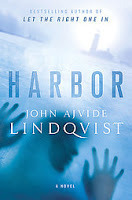
by John Ajvide Lindqvist
Ah, hyperbole, where would we be without you?
I received the ARC of Harbor (to be released in October), and was taken in by the promise of "a sprawling horror epic." But having completed said novel, I make the following suggestion: if you are going to promote your book as a "horror epic," it had better be damned horrific and damned epic. The Stand is a horror epic. Carrion Comfort is a horror epic. Swan Song, Frankenstein, World War Z; these are epics of horror.
Harbor is not a horror epic. It contains elements of horror, yes, but its horrors are muted and small, personally terrifying to a character, yet hardly epic in scope.
That said, Harbor is not a bad read. Indeed, it has moments of creeping dread, and a storyline presented in vivid yet intimate detail. It's no horror epic, but it has elegance and style, and it takes time to build up its characters so that the horror, when it comes, is all the more intense. But it's also flabby and awkward, and makes the cardinal sin of having secondary characters far more interesting than the lead.
To be fair, it starts like gangbusters. On the remote Swedish isle of Domarö, Anders and Cecilia have taken their daughter Maja for a winter hike to a lighthouse, when she mysteriously vanishes. Cut to two years later; Anders is now a compulsive alcoholic, his marriage long dissolved, coming back to Domarö because it is the only thing he has left that still connects him to his daughter. His grandmother Anna-Greta and her companion Simon take care to keep him alive, but both are harboring secrets about the island, and from each other. There is an evil to Domarö, and Maja may have been a victim to something that has ruled the sea for centuries.
This has the potential to be a great, old-fashioned horror story, the kind that emphasized character and atmosphere over shocks. Domarö is an intriguing place, and even if the island never becomes what I hoped it would—there were echoes of Lovecraft early on, and I had visions of a great Cthulhu uprising that was not to be—it retains an aura of menace that Lindqvist and his translator (from the original Swedish) evoke with care and restraint.
Yet after a while, it becomes apparent that Harbor, for all its plentiful strengths, is rather schizophrenic, as if Lindqvist could not make up his mind what story to tell. Frankly, Anna-Greta's and Simon's story is by far the more compelling; Lindqvist goes into great detail over Simon's past life as a magician and escape artist, a man who one day discovers a strange insect that imparts to him supernatural powers over water. Simon's story is laden with intrigue and suspense, and his relationship to the secrets-holding Anna-Greta becomes the lynchpin for the entire narrative. Or rather, it should have, as it's by far the more effective plotline. Yet Lindqvist awkwardly fuses their story with that of Anders, who through his alcoholism and mania is a far less interesting protagonist. His missing daughter plotline may be more readily identifiable to readers—how many of us have been granted water-based superpowers?—but it doesn't hold the attention.
I am not familiar with Lindqvist's past work—all I know of him is the Swedish film adaptation of his vampire novel Let the Right One In and its American counterpart Let Me In, both very strong, atmospheric horror films with some poor CGI moments. Based on those movies, I will one day read the novel, as Harbor displays a writer with true gifts. Sadly, Harbor is very likely lesser to his previous work, a novel full of ideas that is unable to string them together.
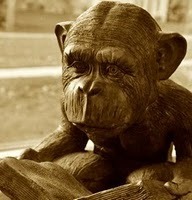
VERDICT: MONKEY LOVES MOMENTS, BUT ONLY LIKES THE WHOLE
And he finds some.
And he learns that sometimes, magic is not enough.
Vegas Knights (2011, Angry Robot)

by Matt Forbeck
I love me some magic realism. Taking the world as it is today, twisting it out of shape through supernatural means, always entertains me a sight more than the usual fantasy output of vaguely middle age-ish scenarios wherein dwarfs, elves, and centaurs form gangs and quest to their hearts content. Not that those are necessarily bad, it's just that I have a hard time relating. Put those same characters in a realistic setting, and I'm there. Lev Grossman's The Magicians is one of the best fantasies I've read in years, right up there with Susanna Clarke's Jonathan Strange and Mr. Norrell.
So a novel about magicians set loose in Nevada would seem ideal. Or at least fun. And Matt Forbeck's novel is fun, in a free-wheeling, loosey-goosey way. I just wish it had some more meat on its bones.
Bill and Jackson are, outwardly, fun-loving young men bursting to have a good time on the Vegas strip. In actuality, they are novice magicians, on break from their college courses in "trans-quantum postulating," looking to fleece some casinos during Spring Break. Being able to predict cards and change hands would seem an easy way to get some quick cash, but the boys are not aware of the sinister underbelly of the city, one that depends on magic to keep its allure alive. Two magicians playing blackjack is less a rare occurrence than they believe, and soon they discover that they may not be up to the challenge of taking on the entire magician's syndicate.
Forbeck has a lot of fun with this conceit, bringing in some lovely pseudo-science to explain the actuality of magic's existence. As Jackson explains:
Makes perfect sense. Or not, really, but it's fun to play with."That's the stigma that surrounds magic—that it's the product of demonic pacts or other crazy things—but it's nothing close to the truth. Using your mojo is simply the conscious manipulation of the quantum state of things. By taking control of an altering probability, we can make things happen that seem magical, but every bit of the process can be explained with science."
But Forbeck isn't a strong enough writer to bring his characters to life. His magicians are heroic and intelligent, but there's no depth to the portrayals. The plot moves briskly, and I can see this making a very enjoyable feature film, but Forbeck's style is too mundane to create much excitement. His prose is plodding, and despite a vivid imagination, he can't summon up the breathless excitement his non-stop narrative requires (for a better example, see Gord Zajac's Major Karnage, a non-stop sci-fi chase that brings enough wit and oomph to the pursuit that you don't even mind some gaping logic holes).
But even more than than, a story of magic requires, well, magic to make it work. Clarke and Grossman and others of their ilk (Tolkien, C.S. Lewis) have genuine mastery of language and style, proving themselves magicians of the highest calibre. Forbeck is likeable, with strokes of originality, but at present he's an off-strip illusionist at best. I wanted to enjoy much more than I did, as the publisher Angry Robot appears determined to produce high-quality genre fiction, as evidenced by its recent re-release of K.W. Jeter's steampunk classics Morlock Nights and Infernal Devices, along with Lavie Tidhar's The Bookman and Camera Obscura. But Vegas Knights is a trifle at best; much like Vegas itself, it plays at glamour, but in the end it's a rather cheap entertainment, diverting but unmemorable.
VERDICT: MONKEY ENJOYS LIKE HE ENJOYS NCIS
Harbor (2011, Thomas Dunne Books)

by John Ajvide Lindqvist
Ah, hyperbole, where would we be without you?
I received the ARC of Harbor (to be released in October), and was taken in by the promise of "a sprawling horror epic." But having completed said novel, I make the following suggestion: if you are going to promote your book as a "horror epic," it had better be damned horrific and damned epic. The Stand is a horror epic. Carrion Comfort is a horror epic. Swan Song, Frankenstein, World War Z; these are epics of horror.
Harbor is not a horror epic. It contains elements of horror, yes, but its horrors are muted and small, personally terrifying to a character, yet hardly epic in scope.
That said, Harbor is not a bad read. Indeed, it has moments of creeping dread, and a storyline presented in vivid yet intimate detail. It's no horror epic, but it has elegance and style, and it takes time to build up its characters so that the horror, when it comes, is all the more intense. But it's also flabby and awkward, and makes the cardinal sin of having secondary characters far more interesting than the lead.
To be fair, it starts like gangbusters. On the remote Swedish isle of Domarö, Anders and Cecilia have taken their daughter Maja for a winter hike to a lighthouse, when she mysteriously vanishes. Cut to two years later; Anders is now a compulsive alcoholic, his marriage long dissolved, coming back to Domarö because it is the only thing he has left that still connects him to his daughter. His grandmother Anna-Greta and her companion Simon take care to keep him alive, but both are harboring secrets about the island, and from each other. There is an evil to Domarö, and Maja may have been a victim to something that has ruled the sea for centuries.
This has the potential to be a great, old-fashioned horror story, the kind that emphasized character and atmosphere over shocks. Domarö is an intriguing place, and even if the island never becomes what I hoped it would—there were echoes of Lovecraft early on, and I had visions of a great Cthulhu uprising that was not to be—it retains an aura of menace that Lindqvist and his translator (from the original Swedish) evoke with care and restraint.
Yet after a while, it becomes apparent that Harbor, for all its plentiful strengths, is rather schizophrenic, as if Lindqvist could not make up his mind what story to tell. Frankly, Anna-Greta's and Simon's story is by far the more compelling; Lindqvist goes into great detail over Simon's past life as a magician and escape artist, a man who one day discovers a strange insect that imparts to him supernatural powers over water. Simon's story is laden with intrigue and suspense, and his relationship to the secrets-holding Anna-Greta becomes the lynchpin for the entire narrative. Or rather, it should have, as it's by far the more effective plotline. Yet Lindqvist awkwardly fuses their story with that of Anders, who through his alcoholism and mania is a far less interesting protagonist. His missing daughter plotline may be more readily identifiable to readers—how many of us have been granted water-based superpowers?—but it doesn't hold the attention.
I am not familiar with Lindqvist's past work—all I know of him is the Swedish film adaptation of his vampire novel Let the Right One In and its American counterpart Let Me In, both very strong, atmospheric horror films with some poor CGI moments. Based on those movies, I will one day read the novel, as Harbor displays a writer with true gifts. Sadly, Harbor is very likely lesser to his previous work, a novel full of ideas that is unable to string them together.

VERDICT: MONKEY LOVES MOMENTS, BUT ONLY LIKES THE WHOLE
Published on June 14, 2011 13:41
June 5, 2011
A lesson in the art of spin; or, I didn't say that, did I?
 Yesterday, I was schooled in the art of spin. Owned. Pwned, as the kids say, bless their unable to spell hearts. And while I am fairly angry about it, a part of me can't help but admire the cojones of all involved.
Yesterday, I was schooled in the art of spin. Owned. Pwned, as the kids say, bless their unable to spell hearts. And while I am fairly angry about it, a part of me can't help but admire the cojones of all involved.A little background:
In my wanderings through the literary landscape, I have had the opportunity to, once in awhile, espouse my views on certain written works for sums of money i.e. I write book reviews for publications. I have always tried to give such reviews my best attention to detail, trying to do more than simply summarize a plot and giving a thumbs up/down. I make no claims to greatness, but I take the work seriously, and try to give every author I read the benefit of a doubt. I have praised books I've admired, and when confronted with the occasional shall we say less-than-stellar offering, I usually do try to put the best face on a bad situation. The authors have presumably worked hard to bring their vision to print, and although I may not enjoy the result, I appreciate the effort.
Ah, but I am human, and flawed. Sometimes a book hits me below the belt, and I cannot help but to respond in kind. In the pages of The Winnipeg Free Press, I laid waste in five hundred words to such destroyers of trees/hope as Michael Slade's Bed of Nails and Paulo Coelho's Eleven Minutes, barely containing my rage at how such authors managed to scuttle away with vital hours from my life with their horrible prose, insipid characters, and limp narratives. We all have read such books, and cannot help but rail even when public opinion is against you, or if your own common sense tells you to back off, that you are making a fool of yourself.
Such it was with Chuck Palahniuk's Tell-All. My review was not so much an incisive dissection of a novel as it was a rant against an author I deeply admired for foisting upon his abundant fanbase a novel so lazy, so flaccid, and so dreary. In the past, I had forgiven Palahniuk for lesser efforts such as Snuff, knowing that even the greatest authors had off days. A man who gave me the gruesome, obscene satirical pleasures of Fight Club and Rant and Choke had earned some leeway. But Tell-All is atrocious, a novel that would likely never have been published save for his name on the cover. I place it in the same terrain as the gut-wrenchingly awful books of James Patterson, the flavourless spewings of Stephanie Meyer, the utter stupidity of Tim LaHaye. In the annals of disappointing releases from authors I deeply admire and respect, it belongs in the same category as Ira Levin's dismal Son of Rosemary, Richard Matheson's inane Seven Steps to Midnight, and Robert A. Heinlein's lamentable The Number of the Beast. I condemn it to the basest reaches of my filth-laden soul, and continue to do so, even as I begrudgingly admit that I'm looking forward to Palahniuk's next novel, it sounds like all sorts of awesome.
So, I trashed Tell-All in the Arts section of the Winnipeg Free Press, and I stand by my words. So it was with no small amount of surprise that I picked up the recent Canadian paperback release (to see who, if anyone, had actually praised it), and read the following on the back cover, just underneath the plot summary:
Huh."A devastating dissection of celebrity . . . classic Palahniuk fare." — Winnipeg Free Press
I checked my original review, and found the sentence in question:
Of course, this sentence handily ignores the rest of the review, including the following nuggets:Written in a style akin to gossip tabloids of the time (complete with boldface font for every name mentioned), the novel promises on its surface to be a devastating dissection of celebrity, classic Palahniuk fare.
andBut with Tell-All, his fourth novel in as many years, Palahniuk simply gives up, delivering a novel as negligible in size as it is in ambition.
andTell-All is the effort of an author who has utterly given up. It is a soggy, misshapen mess of half-baked parody and puddle-shallow inspiration.
Wow, that was harsh. I may have forgotten to take my happy pills that day.Tell-All is an insulting shrug of indifference from an author who once actually mattered on the literary scene.
Now, in addition to working as a reviewer and author, I earn a living as a publicist for a highly-regarded independent Canadian publisher. So I am intimately familiar with the concept of 'spin.' I have had opportunity to scour reviews for phrases I can employ to highlight my books in press releases and advertising. And occasionally, I have lifted chunks of wordage and used them slightly out of context, so that a review that rates a book as average can be used to highlight a novel's marvelous atmosphere or rich characters. It's part of the job. Not lying, exactly, but tweaking the truth in a certain way to achieve an intended result.
But this . . . this is complete falsity. They are using a review specifically designed to keep people as far away as possible from their book as a tool to lure people in. They've taken a spray can to a sign labelled DO NOT SWIM, SHARKS IN THE AREA, leaving it blaring to the public, SWIM AREA.
I do admire the ability to make chicken salad out of chicken shit, no question. But when faced with Tell-All, the proof is in the quotes; they did not have many to choose from. Check out the screenshot of the praise page above: most of them are fairly quiet on the novel itself, concerning themselves with Palahniuk and his reputation rather than the merits of the book. I've looked around; critical praise for Tell-All was fairly lacking. The page looks good, but when you come down to it, it doesn't tell you anything more than the praise pages for most of James Patterson's recent books, pages made up of glorious plaudits from bloggers and bloggers only. Yes, I'm being a little snobbish here, but my point is, there is no critical praise from reputable sources to be had. Some show it obviously (Patterson) and some hide it expertly (Palahniuk).
Who to blame? It's all the publishing company, and the publicists. They're trying to sell a product here, the art is left to the artists. I don't blame Palahniuk for the manner in which his company markets him, I only blame him for the product itself.
My point? Could it be, don't believe everything you read? That'll do, I guess. But the real point here is:
I did not praise Tell-All. The Winnipeg Free Press did not praise Tell-All. The quotation is a bald-faced distortion, a lie through and through. If you must read Tell-All, don't blame me if you feel used afterwards.
Published on June 05, 2011 07:51
May 17, 2011
hidden monkey - Crisp by R.W. Gray
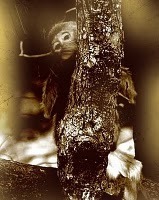 Oh monkey, why do you hide from me?Is it my breath?TELL ME THE TRUTH, DAMN YOU!Today's hidden monkey:
Oh monkey, why do you hide from me?Is it my breath?TELL ME THE TRUTH, DAMN YOU!Today's hidden monkey:
 Crisp (NeWest Press, 2010)by R.W. Graythe hidden monkey plot: Well, these are short stories, so there is no plot per se (however, there is a perfect excuse to use the phrase per se). But to give you a taste of their contents: "Waves" is an exquisite glimpse into a one-night stand with a whale trainer; "Crisp" concerns two brothers whose father is burning eternally in a car fire while their mother swells to bursting inside their house; "Sunflowers" is a breathtakingly sweet tale of an old woman's infatuation with the new young priest of her church; "Wabi Sabi" maps out a wife's attempts to mold and whittle her fisherman husband into a more pleasing form.why is this monkey hidden? Short stories are classically a harder sell for audiences, and unless a collection catches fire (or awards glory), they more often than not gather dust on the shelves. I really only became aware of Gray's collection after the two of us joined forces in a Writers' Circle event out here in Fredericton. Crisp may yet gather a larger audience, however, as its recent nomination for the Danuta Gleed Award certainly provides it with an extra oomph.what does the shelf monkey think? I'm a big fan of magic realism, when done correctly, and Crisp has more than its fair share. Witness this small segment of "Wabi Sabi" after the husband has come home and destroyed his wife's pottery:
Crisp (NeWest Press, 2010)by R.W. Graythe hidden monkey plot: Well, these are short stories, so there is no plot per se (however, there is a perfect excuse to use the phrase per se). But to give you a taste of their contents: "Waves" is an exquisite glimpse into a one-night stand with a whale trainer; "Crisp" concerns two brothers whose father is burning eternally in a car fire while their mother swells to bursting inside their house; "Sunflowers" is a breathtakingly sweet tale of an old woman's infatuation with the new young priest of her church; "Wabi Sabi" maps out a wife's attempts to mold and whittle her fisherman husband into a more pleasing form.why is this monkey hidden? Short stories are classically a harder sell for audiences, and unless a collection catches fire (or awards glory), they more often than not gather dust on the shelves. I really only became aware of Gray's collection after the two of us joined forces in a Writers' Circle event out here in Fredericton. Crisp may yet gather a larger audience, however, as its recent nomination for the Danuta Gleed Award certainly provides it with an extra oomph.what does the shelf monkey think? I'm a big fan of magic realism, when done correctly, and Crisp has more than its fair share. Witness this small segment of "Wabi Sabi" after the husband has come home and destroyed his wife's pottery:In the crisp morning air, she reached out with her two hands and placed them around his ridged and bent-to-purpose neck. She began again, kind, the way she was with flawed clay. Smaller clumps of him fell to the porch as she worked out the impurities, the air bubbles.In the morning she awoke to peaches in the air, and found him in the kitchen making impressionistic waffles, a wounded apology on his lips. He was smaller now, shorter than her, and several kinds of sorry.That's the kind of imagination I love, the ability to combine the fantastic with the humdrum ordinariness of life. In Crisp, no one questions how it is a woman can continually whittle a man into something new, how a fire can never be extinguished, why a trailer should suddenly up and slowly (oh so slowly) roll to the ocean and no one thinks to stop it. Beyond this, Crisp is a revelatory collection, delicate in execution and brutal in impact. Gray has a light touch, almost invisible, and his stories dance across the page even as they leave indelible impressions in the mind. Like the best short story writers, Gray understands the importance of being concise, of never wasting a word. His characters are all yearning for something, something beyond their control; love, or stability, or silence, or sanity.hidden monkey verdict: this monkey shouldn't stay hidden. come out, little monkey, don't be scared
Published on May 17, 2011 13:09
hidden monkey - Crisp by R.W. Gray
 Oh monkey, why do you hide from me?
Oh monkey, why do you hide from me?Is it my breath?
TELL ME THE TRUTH, DAMN YOU!
Today's hidden monkey:
 Crisp (NeWest Press, 2010)
Crisp (NeWest Press, 2010)by R.W. Gray
the hidden monkey plot: Well, these are short stories, so there is no plot per se (however, there is a perfect excuse to use the phrase per se). But to give you a taste of their contents: "Waves" is an exquisite glimpse into a one-night stand with a whale trainer; "Crisp" concerns two brothers whose father is burning eternally in a car fire while their mother swells to bursting inside their house; "Sunflowers" is a breathtakingly sweet tale of an old woman's infatuation with the new young priest of her church; "Wabi Sabi" maps out a wife's attempts to mold and whittle her fisherman husband into a more pleasing form.
why is this monkey hidden? Short stories are classically a harder sell for audiences, and unless a collection catches fire (or awards glory), they more often than not gather dust on the shelves. I really only became aware of Gray's collection after the two of us joined forces in a Writers' Circle event out here in Fredericton. Crisp may yet gather a larger audience, however, as its recent nomination for the Danuta Gleed Award certainly provides it with an extra oomph.
what does the shelf monkey think? I'm a big fan of magic realism, when done correctly, and Crisp has more than its fair share. Witness this small segment of "Wabi Sabi" after the husband has come home and destroyed his wife's pottery:
In the crisp morning air, she reached out with her two hands and placed them around his ridged and bent-to-purpose neck. She began again, kind, the way she was with flawed clay. Smaller clumps of him fell to the porch as she worked out the impurities, the air bubbles.That's the kind of imagination I love, the ability to combine the fantastic with the humdrum ordinariness of life. In Crisp, no one questions how it is a woman can continually whittle a man into something new, how a fire can never be extinguished, why a trailer should suddenly up and slowly (oh so slowly) roll to the ocean and no one thinks to stop it. Beyond this, Crisp is a revelatory collection, delicate in execution and brutal in impact. Gray has a light touch, almost invisible, and his stories dance across the page even as they leave indelible impressions in the mind. Like the best short story writers, Gray understands the importance of being concise, of never wasting a word. His characters are all yearning for something, something beyond their control; love, or stability, or silence, or sanity.
In the morning she awoke to peaches in the air, and found him in the kitchen making impressionistic waffles, a wounded apology on his lips. He was smaller now, shorter than her, and several kinds of sorry.
hidden monkey verdict: this monkey shouldn't stay hidden. come out, little monkey, don't be scared
Published on May 17, 2011 13:09



